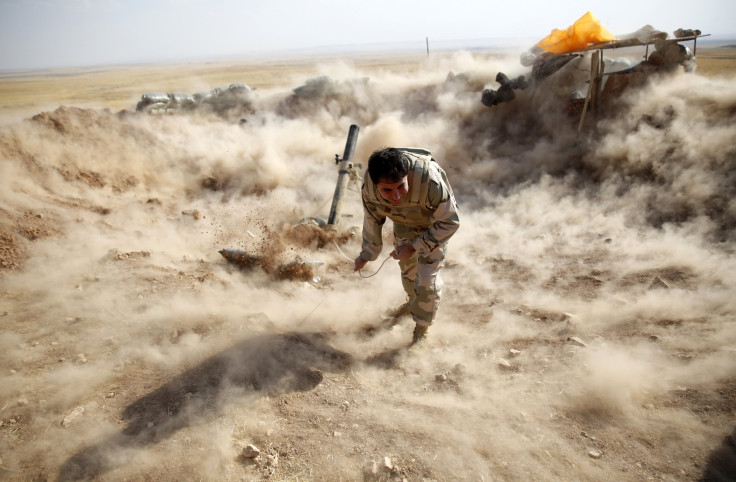Kurds Turn To Washington Lobbyists To Convince Obama Administration To Arm Them Directly, Bypass Baghdad: Report

Kurdish fighters are hiring lobbyists in Washington to convince the U.S. government to send them arms directly rather than routing them through Baghdad, in an effort to expedite and strengthen the fight against the Islamic State group in Iraq. Forms filed in 2015 under the Foreign Agents Registration Act show the Kurdistan Regional Government has spent $291,000 on three different firms.
The Kurdistan Regional Government (KRG) has for months pressured Baghdad to expedite the shipment of arms to Iraqi Kurdistan, but so far, the fighters claim, progress has been slow. Earlier this year Sen. Joni Ernst, a Republican from Iowa and a member of the Senate Armed Services Committee, tried to pass a bill that would have allowed the U.S. to ship weapons to the Kurds directly.
“ISIS is deadly and determined, and Iraqi Kurdish Peshmerga forces, our critical partner in the fight against ISIS, need U.S. weapons as quickly as possible," Ernst said in May. "We simply cannot afford to have future delays at this critical moment in the battle."
At the time of the introduction of the bill, Denise Natali, an expert on Iraqi Kurdistan at the National Defense University in Washington, told International Business Times that the bill was not going to pass because it would require an amendment to a law that allows the government to send weapons to internationally recognized sovereign governments but does not include autonomous regions. The bill failed to pass, as Natali expected, but that failure spurred a movement among advocates in Washington to enlist lobbyists to take the fight directly to the hill.
The Kurds aren't the only group of fighters in Iraq that claim Baghdad is hoarding weapons in the capital. The Sunni militias in the country's western Anbar province have also complained.
“The U.S. government has not provided us with the weapons directly. The Iraqi military has them,” Muhand Murshad Drueesh Alwany, a Sunni militiaman in Ramadi who also fought alongside U.S. troops in Anbar in 2007, told IBT in February. The lack of direct weapon shipments, the tribesmen said, prevented them from defeating the Islamic State group in major battles such as Tikrit and Ramadi.
U.S. policy in Iraq is to send arms directly to Baghdad and allow the Iraqi military to distribute them to different fighters across the country accordingly. But tensions remain between the central government and various religious and ethnic factions, including the Kurds and the Sunni tribes. Distribution has been slow as the Iraqi government works to recruit and train fighters before arming them. The U.S. has also been helping to train fighters with the aid of military advisers.
The first U.S. troops to enter the fight against ISIS militants arrived in November. President Barack Obama sent 1,400 of them to Anbar to help the Iraqi military plan the fight against the extremist group, which had already taken over more than 80 percent of the province. Hundreds of U.S. troops, stationed at Al Asad Airbase, have been training Iraqi soldiers over the past year. At the same time, U.S. troops are trying to build up a Sunni-dominated national guard made of tribesmen; several hundred Sunni tribesmen have been trained alongside U.S. military advisers, and thousands of others by the Iraqi military.
Given the established relationship between the U.S. and Iraqi military in training fighters in Anbar, Kurdish lobbyists in Washington face a difficult task. The U.S. is committed to maintaining its relationship with Baghdad and overseeing the strengthening of the central government, especially after the downfall of Prime Minister Nouri al-Maliki; any move to bypass Baghdad to assist the KRG would risk a deterioration of the U.S.-Baghdad relationship.
© Copyright IBTimes 2025. All rights reserved.





















